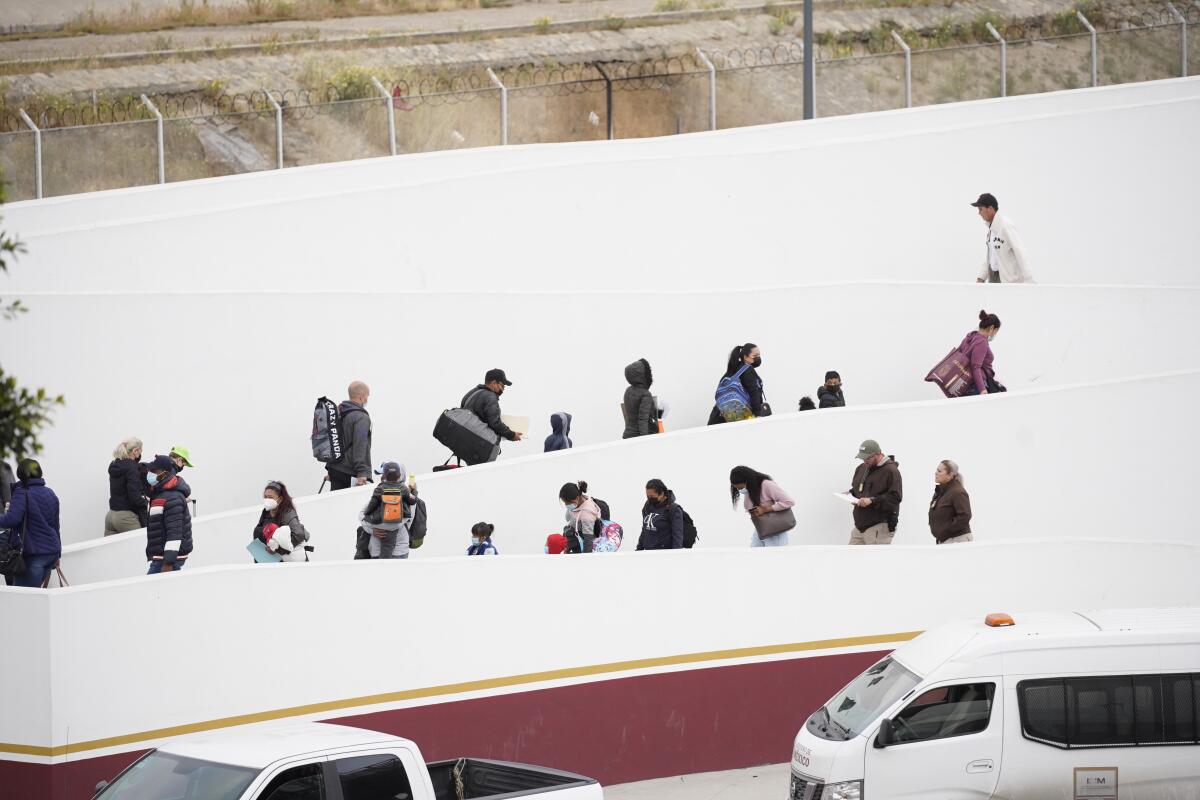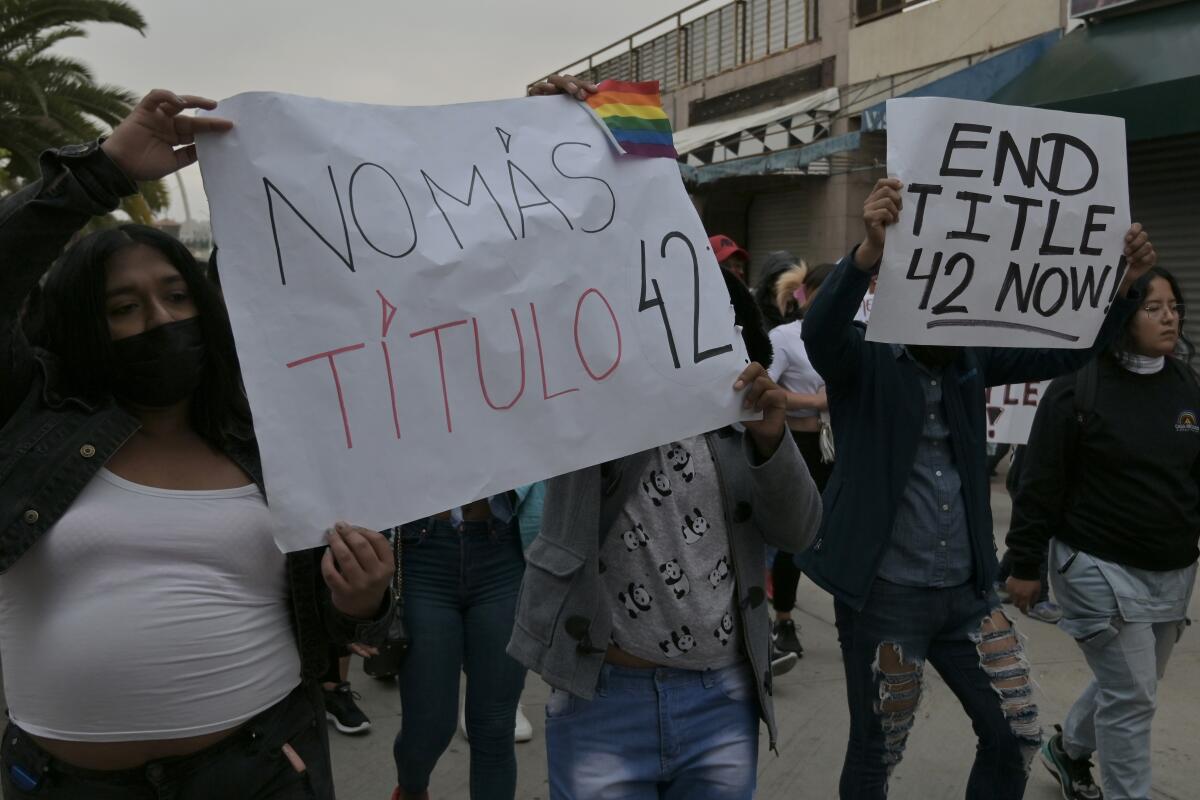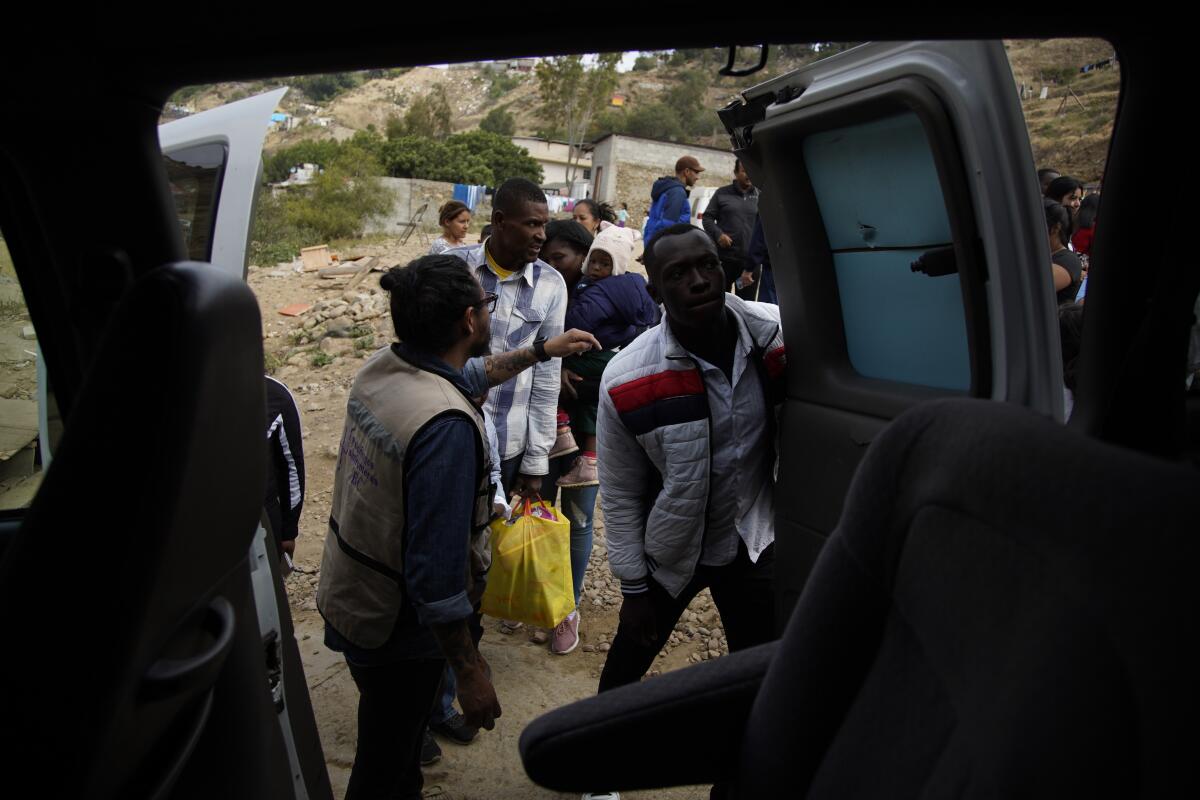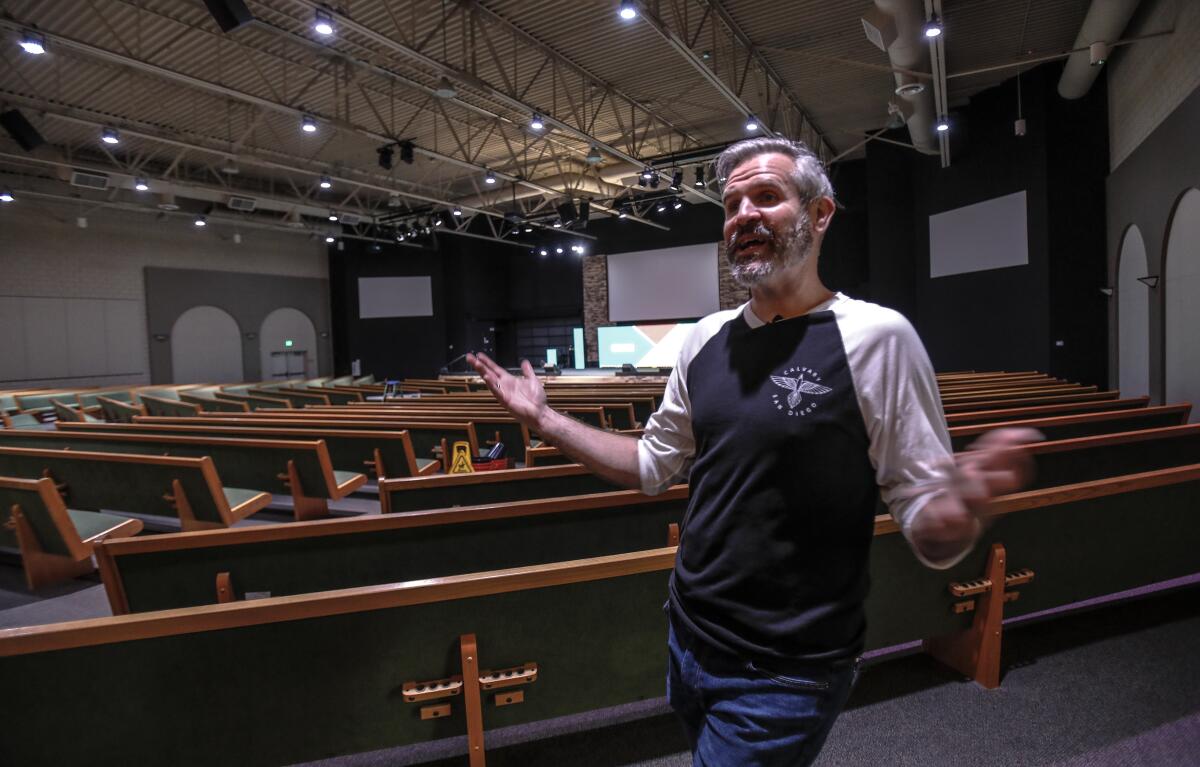Requesting asylum is supposed to be free. But corruption in Tijuana means many have to pay

- Share via
SAN DIEGO — When a Russian family, threatened because of their opposition to the war in Ukraine, recently arrived in Tijuana, they tried every tactic they’d heard of to reach the United States and request asylum.
After being turned away at the border, they found a Telegram channel, where they were told that an organization could help them cross at the port of entry on foot with permission from Customs and Border Protection — but they would have to pay. The price was $2,000 per person.
Multiple sources have told the Union-Tribune about similar issues of extortion and corruption in the temporary program for processing some asylum seekers while Title 42, a U.S. pandemic border policy, remains in effect. None of them was willing to be named, citing serious safety concerns related to organized crime.
Title 42 is a policy that broadly blocks asylum seekers and other migrants without proper travel documents from entering the United States, and it allows border officials to expel those who do cross either to the country they crossed from or their home countries.
However, earlier this year, the Department of Homeland Security partnered with local nonprofits to identify particularly vulnerable asylum seekers in Tijuana and elsewhere along the border. The organizations submit the cases to Customs and Border Protection for approval on a case-by-case basis for exemptions to Title 42. Once approved, Tijuana-based asylum seekers are given a date to appear at the San Ysidro Port of Entry’s PedWest and enter the United States.
San Ysidro Port Director Mariza Marin told the Union-Tribune in September that 180 people are allowed to cross each day through the exemption program. The various partner organizations have a set number of slots within that 180 each day.
The people within those organizations control who gets on the list and in many ways control who has access to requesting asylum while Title 42 is in effect.
Asylum seekers are not supposed to have to pay to request protection — it is considered a basic human right in the United Nations’ Universal Declaration of Human Rights. The asylum system determines who among arriving migrants qualifies as a refugee.
While there are costs to the nonprofits that do the logistical work for Title 42 exemptions of identifying particularly vulnerable asylum seekers and bringing them to the border — such as transportation or staff wages — those costs are not supposed to be passed on to the asylum seekers. The exemption process is supposed to be free for the migrants because it is meant to identify and protect the most vulnerable.
While asylum seekers are still able to access the Title 42 exemption process for free through certain organizations, the Union-Tribune has since August received a growing number of reports of asylum seekers having to pay. It’s unclear who is ultimately benefiting from the money or if it is going to the same people in every case.
Customs and Border Protection deferred to the Department of Homeland Security when asked via email about reports of corruption in the program, and Homeland Security did not respond to a request for comment.
When asked about payments in the exemption process in September, Marin said that Customs and Border Protection works with multiple nonprofits rather than one to try to mitigate the issue and that the agency works closely with the State Department when migrants tell officers about such security concerns.
“The most important thing is that there is accessibility to a legal pathway. That was closed for quite a while,” Marin said. “It’s difficult for CBP, being a domestic agency, to change the threat picture and what goes on in Tijuana.”

Deterrence and corruption
Though Title 42 is scheduled to end Dec. 21 under a judge’s order, that is not likely to make the issue disappear. Some politicians are already trying to find ways to preserve its asylum restrictions, and the Biden administration is appealing the order.
It’s also not yet clear what asylum processing will look like if the policy does lift. The United States has long used deterrence policies to restrict access to its soil and to the asylum system.
Title 42 is not the first time that the United States has restricted asylum access in a way that gave control to various groups in northern Mexico. Nor is it the first time that corruption concerns have surfaced in the resulting process to access asylum screenings.
When wait lists to request asylum in the United States became managed by Mexican immigration agents in the years before the pandemic, human rights researchers noted instances of corruption in those processes, as well.
With bigger organized crime groups taking more active interest in migration at the U.S.-Mexico border, there are concerns that the money involved in Title 42 exemption processing will ultimately end up benefiting them, too.
“The overall framework of this is that our restrictive asylum policies have been putting money in the pockets of organized crime over the last few years,” said Adam Isacson of the Washington Office on Latin America, a human rights research and advocacy organization. “We’ve been enriching organized crime this way for a while. This is just a new dimension to it.”
Many human rights advocates have argued that the only way to prevent corruption and extortion in the asylum process is to make asylum screenings accessible to anyone fleeing their homeland who approaches a U.S. port of entry. That is generally required under U.S. and international law, but it has not been the reality at the border for years, even before the pandemic.
Even without the payments, finding the exemption process can be difficult for asylum seekers.
Asylum seekers wanting to apply for the exceptions have little reliable information to go on, oftentimes counting on word of mouth, social media or the chance of stumbling upon the right shelter. Customs and Border Protection does not have an official website or tip sheet, and from what the Union-Tribune has witnessed, officers also don’t provide that information to asylum seekers who approach the border.

There is no consistency in how to access the organizations that determine who will be submitted to Customs and Border Protection for approval, and it is not clear how the different groups determine who is eligible or who should be prioritized among the many waiting asylum seekers in Tijuana. At least one organization chosen by Homeland Security partners with Tijuana shelters to determine who will be next to go in. Another organization has an online form that can be filled out to start the process, and at least one uses Telegram.
With so many in desperate situations, the wait times have grown long.
Shelters known for having access to the process sometimes have dozens of asylum seekers camped outside, waiting for their chances to get on the lists. One shelter director told the Union-Tribune that the wait time for people in his care has at least doubled since the exemption process began earlier this year.
As the waits grow, so does the potential for corruption in the process.
Paying for access
Because of the potential danger in discussing corruption in the Title 42 exemption process, the extent of it is not fully clear, but details are beginning to emerge.
Several asylum seekers from Latin America told the Union-Tribune about certain shelters charging for access to the exemption process or to be placed higher on the wait list.
A nonprofit that helps identify vulnerable cases found out recently that someone was selling its contact information to asylum seekers for thousands of dollars. The organization asked not to be named because of safety concerns.
Border Angels, one of the organizations working with the shelters to identify exemptions, has stopped working with multiple shelters because of corruption concerns, according to Edward Orendain, the nonprofit’s interim executive director.
Multiple sources said that many Russian asylum seekers in particular have had to pay for access. In October, 2,865 Russians entered through the San Diego port, according to the most recent data from Customs and Border Protection.
The day after Thanksgiving, a Russian-language YouTube channel uploaded a 25-minute edited video interview in which Phil Metzger, pastor of Calvary San Diego church and president of Most v USA, discusses the exemption process. The Most v USA organization, whose name roughly translated from Russian means “Bridge to the USA,” focuses on helping Russian and Ukrainian speakers cross.
At one point in the conversation, interviewer Alex Moore, whose channel focuses on information for Russian speakers coming to the United States, calls the situation scary.

“Well, it is a dangerous border,” Metzger says in the video in English. “Our people are totally safe. That’s why it costs money.”
It is not clear from the video whose pockets the money ends up in or how the payments work. Moore, speaking in Russian, brings up concerns from his followers about $2,000 payments, but he does not push Metzger for many details.
“We are operating in Mexico, and it’s not a safe border,” Metzger says in the video. “It is one of the busiest borders in the world. The amount of drugs makes it a very dangerous border, and there are people who control borders. We have to partner to make sure people coming across are safe. People are not paying for a future case — nope, unfortunately no. They’re just operating, and we had to work with these people to make sure that things stayed safe for our Russian speakers that are crossing.”
Metzger calls the people who are getting paid “opportunists.” He declines to further identify them in the video.
“I don’t know how much I want to say about who they are or who they aren’t because I don’t know. I just know that there’s a lot of power on that side that I just don’t control,” Metzger says in the video, which appears to have been filmed Nov. 21. “But I have one control. I control who goes across, so I have to negotiate to keep those people safe. I have to negotiate with those who are in power.”
In the video, Metzger describes the way that Russian-speaking asylum seekers can get help crossing with Most v USA.
The process begins on the social media platform Telegram, he says. From there, asylum seekers get connected with the Most v USA call center. He says the organization receives more than 1,000 messages per day.
“We’re going to get their information. ‘Where are you right now? Who are you? What kind of passport do you have?’” Metzger says in the video. “If all the information fits, then we move them to the second phase, and the second phase for us to collect all of their passport information for CBP and to get them prepared for a date that we will give them to be able to cross into America. We work directly with CBP on all of this.”
The day before they cross, he notes, they must test negative for the coronavirus. Then they meet at the border to get processed by CBP, he says.
When questioned about his statements in the video just over a week later, Metzger told the Union-Tribune his organization does not charge people in order to cross with the Title 42 exemptions or negotiate with anyone.
“I’ve heard there’s groups doing that. We’re not doing that,” Metzger said in a phone interview. “We work with people — our main focus where we have fees is when they’re in the States, helping them with political asylum cases. That’s a totally separate thing.”
When asked further about his organization’s consulting work, he was unable to provide information about fee amounts.
He told the Union-Tribune that some people who crossed with his organization said that they had to pay at some point along their journey. He said he would rather shut the program down than have it be unsafe for the people crossing.
“Every day people are using our company to scam people. Every single day,” he told the Union-Tribune. “Every day we work hard to try to stop that from happening because it’s just what’s happening. People are paying money to people here or there, right, left and center. Now for us we do a lot of consulting that has nothing to do with the border crossing itself.”
He did not directly answer a question from the Union-Tribune about whether he had brought his concerns about safety in the program to Customs and Border Protection.
“I mean, this is happening in Mexico, so it’s a Mexico focus,” he said at first.
Then he denied knowing anything about the Title 42 exemption program.
“I’m not trying to be ignorant or anything, but I don’t even know what that is exactly,” he said.
Russians have long gotten information about how to request asylum in the United States from YouTube channels. As of Thursday, the video had more than 34,000 views, and the comments were filled with Russian speakers thanking both the interviewer and Metzger.
Toward the end of the video, Moore calls Metzger a hero. Metzger denies the label.
Throughout, he emphasizes how much he cares about the asylum seekers.
“We pray for them, everybody. We care for them,” Metzger says in the video. “We think that this whole situation is terrible, and we’re trying to make something safe out of something that could be really bad, very difficult. Because one person calling — this is their life and we try to remember that every time, because we get a thousand of those every day.”
More to Read
Sign up for Essential California
The most important California stories and recommendations in your inbox every morning.
You may occasionally receive promotional content from the Los Angeles Times.











